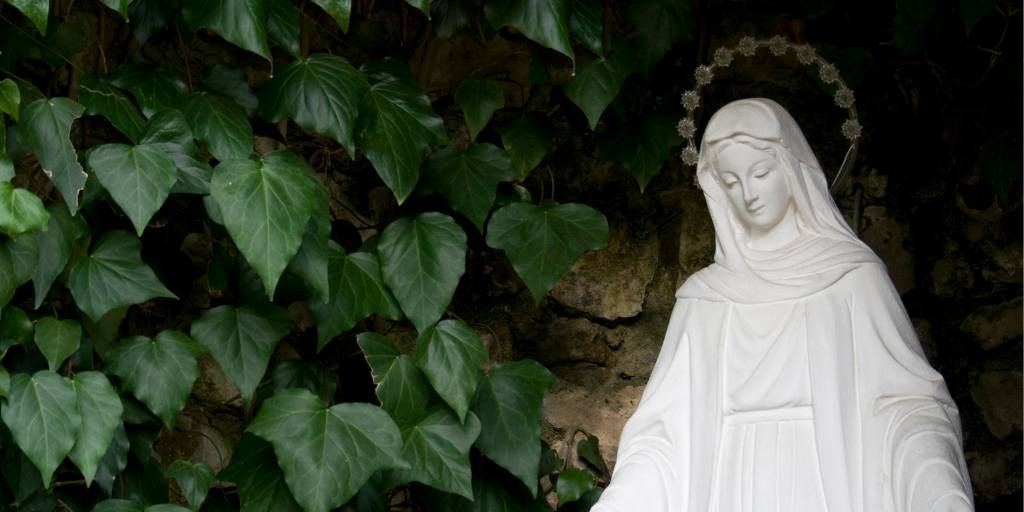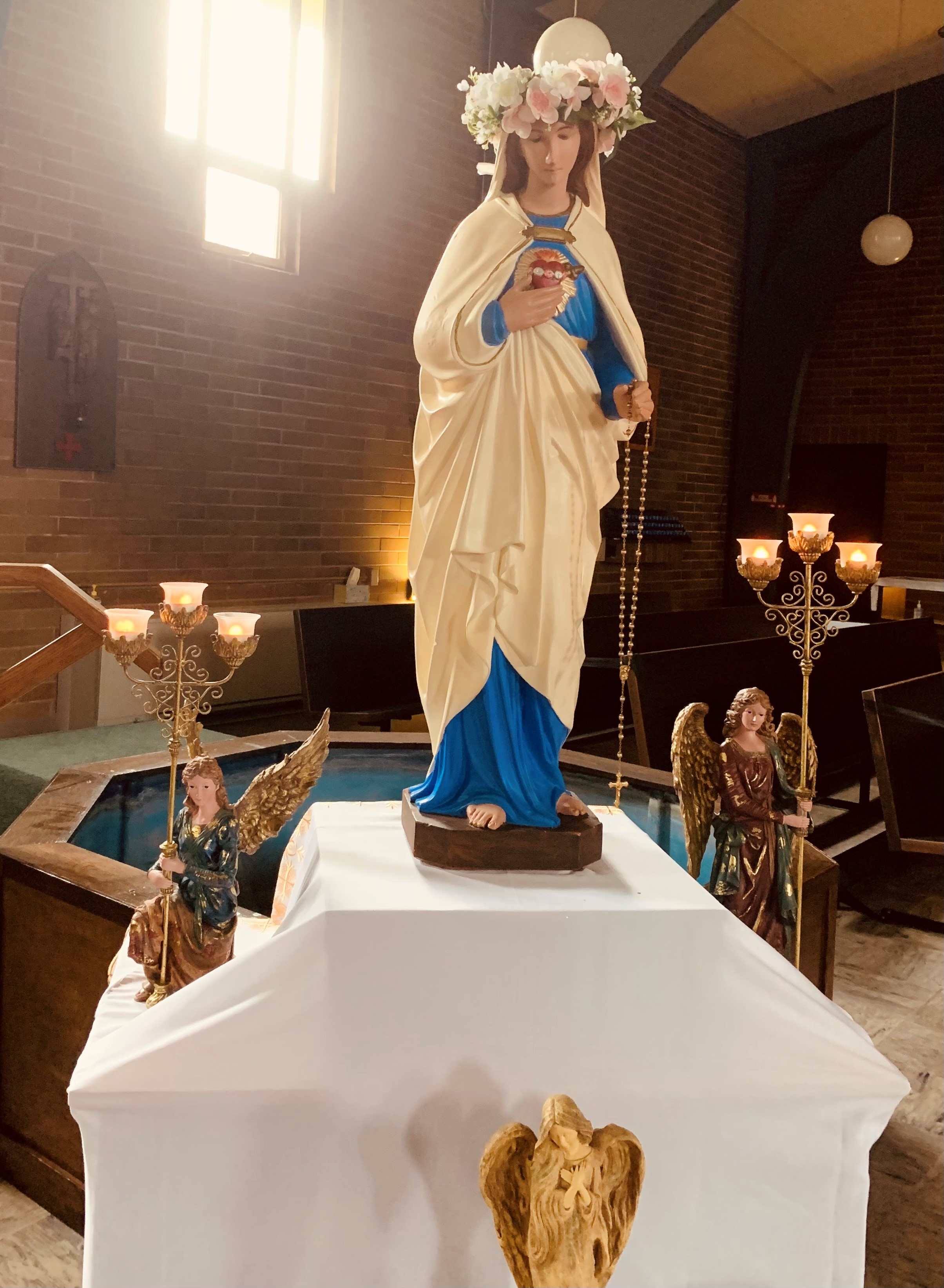
AnnAliese Harry considers the Blessed Mother's example to us as we live out our call to be mothers and spiritual mothers.
My children just lost their remaining great-grandparent. As I sat with the deep thoughts that accompany such realization, while watching my children play, I called to mind that each of us is a product of a woman who has gone before us. Some of us have tricky relationships with the women who have gone before, while others have beautifully warm relationships, and others still have non-existent relationships due to a myriad of factors.
No matter what, each of us is a product of a woman to whom we were born – regardless of whether or not we were raised by that woman.
We are coming to the close of April, with many of us focusing our sights on May. Traditionally, May is known as the “Month of Mary,” and it is in this month we also see the regular U.S. secular world honoring mothers with Mother’s Day. The messages that run in the secular world focus on physical mothers, but there is a certain beauty in the Church which honors that all women, regardless of ability to have children, are called to a form of “spiritual motherhood.”
To be a woman is an invitation to open one’s self selflessly – to emulate the Blessed Mother in opening our arms to those we may not have borne of our own bodies. Being a woman is an invitation, and dare I say challenge, to hold “all things” in our hearts, rather than spending time with friends gossiping and complaining. It is a calling to recognize the least among us, and in our own unique manner, play our part to let them know they are recognized … and loved.
Throughout history, we have seen examples of strong, courageous, exemplary women. Our secular world likes to tout the saying, “Well behaved women rarely make history.” Yet, in our Catholic tradition, a well-behaved… a perfectly behaved, to be exact… woman did make history – not just for herself, but also for the rest of us! She displayed strength and courage, but also typified perfect humility in recognizing her role was to serve as the “handmaid to the Lord” (Luke 1:38; 1:48). When she proclaimed in her Magnificat that, “all ages call me blessed,” (Luke 1:48) it was an acknowledgment that her willingness to serve such a critical role in Salvation History would have a ripple effect impacting generations.
Mary’s devotion to God extended from the Father, to becoming the spouse of the Holy Spirit, and rearing of the Son. Through her role, she would perfectly point us to what love looks like for the Trinity – honoring God the Father’s will at all times, allowing the Holy Spirit to work through us, and recognizing the Son in all of our encounters. She continued to do God’s will perfectly to the end, with her willingness to achingly journey along to the foot of the Cross on Calvary, and assent to an arguably even more difficult role – to become mother to us all (John 19:26).
Part of the beauty of Scripture is we see a clearly worn path toward heaven. From the prophets of the Old Testament to the fulfillment of salvation in the Gospels, to the wisdom and history of the saints of the New Testament, there is a very clear sign on what it takes to get to heaven. The journey to our salvation takes courage to look outside of ourselves, and actively see and react to the needs of others before us. Nowhere is that more clear than John 19:27, in which we see where faith leads to action when the disciple with Mary, “took her into his home.” In addition to John’s example of love for another, we find the very clear instruction in James 2:17, “So also faith of itself, if it does not have works, is dead.”
Mothers attend to the needs of their children, and Mary has continued to attend to our needs as history continues to be made. Even if we are to not consider the numerous Vatican-approved apparitions throughout history, we see a mother’s love in action through the very few words of Mary in scripture. Her final quote in Scripture instructs us to do as Christ tells us (John 2:5), and we find encouragement through her own actions as she stands at the foot of the Cross.
We couldn’t be celebrating the joyous Easter season without the motherhood of Mary. Without her willingness to play an integral part in Salvation History, we would not have our Savior’s birth… we would not experience His death… and, we would not have the opportunity for salvation through His most glorious Resurrection!

As we continue through this Easter season, and celebrate Pentecost in a few weeks, I encourage each of us to consider the mother figures in our lives. We may not even be related to the mother-figure in our lives! Yet, most of us have had a woman who has stood in motherly shoes in our lives.
Even more daunting is the understanding that every single woman is called to act as a mother to others in our lives – whether to our own children, or to those we simply come across in our secular age which preaches tolerance and empathy, yet seems to have difficulty showing the compassion and love the world needs.
As St. John Paul II’s “Letter to Women” (1995) states beautifully,
Thank you, every woman, for the simple fact of being a woman! Through the insight which is so much a part of your womanhood you enrich the world’s understanding and help to make human relations more honest and authentic.
St. John Paul II didn’t paint a picture that the world is perfect, and he didn’t try to lessen the pain that so many women experience throughout the world. Rather, he attempted to encourage us to live as truly authentic women, gifted with virtues, values, and even the most exemplary of all models in our Blessed Mother.
As the women in our lives who have gone before us, so, too, will we shape the world we will leave behind. Sitting with the knowledge of the women on both sides of my children’s family, there is a sense of hope that we, as a collective, are on the right track of changing the world. Learning from the women in our individual histories and applying the lessons we learn from “the Woman” we all share in history, we have the wisdom and the example of what the work looks like.
The question is whether or not we have the courage to emulate our Blessed Mother?
Through our own humility, and by the grace of God in our lives, will we leave in our wake a world which is more compassionate, empathetic, caring, and loving?
Copyright 2021 AnnAliese Harry
Images (from top): Canva Pro; copyright 2021 AnnAliese Harry, all rights reserved.
About the Author

AnnAliese Harry
AnnAliese Harry is a proud Army wife to her husband Chris, and a mother to their young children. She has a BA in History, a Masters in Social Work, and has worked with disabled veterans, troubled teens, and in early childhood intervention therapy. AnnAliese volunteers with several military chapel communities and serves as a lector, EMHC, Adoration coordinator, and Catholic Women of the Chapel (CWOC) chapter president and vice president. She blogs about Catholicism, parenting, and military life at A Beautiful, Camouflaged Mess of A Life. Follow her on Twitter, on Instagram, or on Facebook.


.png?width=1806&height=731&name=CatholicMom_hcfm_logo1_pos_871c_2728c%20(002).png)
Comments